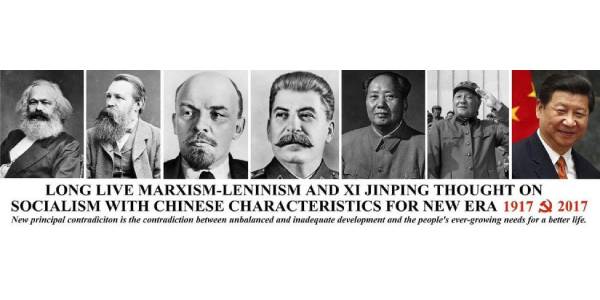From Edward Snowden whistle-blowing the misdeeds of USA’s NSA in 2013 to the recent Cambridge Analytica fiasco involving Facebook, citizens of western nations are becoming increasingly wary of sharing their data, with private enterprises and government organizations alike. And then on the other end of the spectrum we have the Communist Party of China, slowly gearing up to release a ‘Social’ Credit System.
Now anyone with a credit card definitely knows what a credit system and a credit score is. Long story short, the more financially responsible you are, the better your credit score, which then leads you to getting better deals on loans, etc. So basically, your past actions will lead you to getting certain advantages or disadvantages. But currently this only applies to your finances; the way you spend, save and invest your money. What China is doing is taking it a step further and applying the same underlying principle (past determines the present) to the way you carry yourself in society. Be a good citizen, conduct yourself in a manner that is generally accepted as morally ‘good’ and you’ll get certain benefits; be a bad boy and you pay the price, sometimes quite literally. All of this will requires the government to collect immense amounts of data about peoples’ day-to-day lives; something which many may find intrusive and an infringement of their right to privacy.
Before we go into the ‘how’ of things, let’s first delve into the ‘why’, because that will give us an interesting insight into the thought-process of China’s leadership, it will give us an understanding of what their endgame is; why despite having a relatively open economy they still are so persistent in their love for marxism, or rather the way they have manifested it, i.e., ‘socialism with Chinese characteristics’. With this system, they are making an attempt to stress the ‘Chinese’ in socialism.
When people look at China’s ruling party, they think of it as being communist, i.e., they look at only the economic and political angle; a closed economy and a unicameral political system. This view of the Communist Party of China is only partially true, at best; in fact the former is no longer true as China’s economy isn’t closed anymore and to see that all you need to do is look at your phone, I bet it’s made by a private Chinese firm. Although having the word ‘communist’ in its name, the CPC is more ‘marxist’ than ‘communist’. What really is the difference though? The difference is that communism is only a part of marxism. Communism only acts on the economic and political ideologies forwarded by Karl Marx; whereas marxism also comprises of one other very important aspect, a social one. Karl Marx, with his theory, didn’t only want to make society more prosperous, but rather he dreamt of a society which is happier, kinder, with people who are overall more content with their lives. So by proposing a system where everybody ‘shares’ what they have, he attempted to hit two birds with one stone.
Marx’s theory has been whole heartedly adopted by the CPC and placed in a Chinese context; calling it the ’Chinese Dream’. And while rapid economic development has made the average Chinese richer, the CPC now wants to make the average Chinese ‘nicer’. This social credit system aims to achieve just that. China’s CPC doesn’t view itself as just any other government like all other countries have; it views itself as a spiritual successor to the Qing Dynasty, China’s last dynasty. This thought also reflects in the territorial claims made by China. And being a spiritual successor to an ancient dynasty also means wielding the mantle of responsibility to restore China to its former glory. This requires not only economic development, but also a change in the mindset of the people which has deteriorated in all of Asia due to decades of colonialism and poverty. In order to become a great nation, both the economy and the society have to develop.
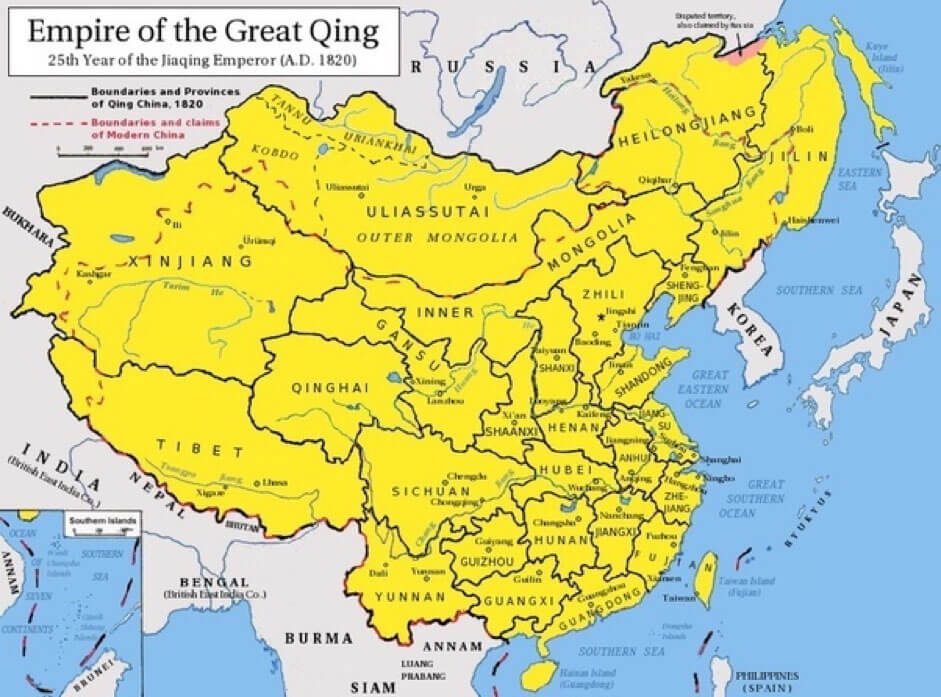
While people may give this system a political angle and rake in their data privacy concerns; I look at it in the context of trying to make people ‘less materialistic’. One could say it is an attempt to achieve what Bhutan tries to achieve with its ‘Gross National Happiness Index’. In fact, this social credit system could very much contribute to creating a new index to replace the old GDP; one which could better reflect the prosperity of people individually and the society collectively.
What is this ‘社会信用体系’or ‘Social Credit System’?
This is a project that has been prepared over a long period of time: In the late 1990s, Lin Junyue, an expert in information retrieval and credit ratings, and his working group at the Institute of World Economics and Politics of the Chinese Academy of Sciences developed the basic concepts and mechanisms of this system. Lin himself is often referred to as the pioneer of the “Theory of the Social Credit System”.
The Chinese word for ‘credit’, ‘信用’ (xinyong) stems from Confucian ethics and morality and is in fact a moral concept indicating the moral dignity and trustworthiness of an individual. Now while for western folks, credit applies only to finances, the same can’t be said of Chinese. In a way, the Chinese government is actually taking the concept of credit or xinyong back to its original roots. This policy falls in line with the CPC’s self understanding of being an heir to a dynasty and trying to take china back to its ancient glory.
Now let’s talk about the implementation of this system. The very first step is to classify what constitutes ‘good behavior’ and ‘bad behavior’ because the difference can sometimes be quite fuzzy. And who’ll get to decide this; obviously in China’s case it will be the Communist Party of China who has the sole moral authority to decide that. Currently the Chinese government has launched three dozen ‘pilot programs’ in various cities in China. These programs are meant to test the waters, mind you, the CPC WILL launch this social credit system nation-wide by 2020, there is no stopping that, but currently the government is launching it at a smaller scale in more developed areas to gain valuable user data which will make full-scale implementation much smoother. Another thing these pilot programs will accomplish is to help the authorities finalize the ‘weights’ for different ‘acts’; simply put, how severe should a punishment be for a certain misdeed or how big of an advantage should one be given for doing a certain good deed.
In the pilot program stage, various acts which are considered ‘offenses’ include, not paying back your debt, jaywalking, cheating in online games, playing too many online games (this is actually a major problem among Chinese youth), breaking traffic rules, drunk driving, not showing up at a restaurant without cancelling the reservation, etc. And the ‘punishments’ include, getting publicly shamed on TV screens in public spaces, having a remotely personalized dialer tone so that callers will hear: ‘the person you are calling is blacklisted’, prohibition from buying train and/or flight tickets, etc.

On the flipside as we have mentioned, being morally responsible citizen can earn you brownie points. Such acts include donating to charities, participating in social work, taking care of your family (due to the single child policy till 2016, this is now a problem in China), donating blood, etc. And the rewards for good behavior include, having your name and photo displayed in public places as a ‘civic hero’, getting better deals on housing loans, free access to gyms, waiving off of library deposit fees, cheaper public transport, shorter waiting times at hospitals, etc.
 Pictures of Rongcheng’s ‘civic heroes’ are displayed around city hall. (Simina Mistreanu)
Pictures of Rongcheng’s ‘civic heroes’ are displayed around city hall. (Simina Mistreanu)
All of the above activities, good or bad, will be backed up with official documentation, thus reducing the chances of corruption and subjectivity. But there are many instances where one may be wondering how official documentation will even be possible, for example, jaywalking. The authorities have already thought this through. There has been extensive research done for this nation-wide social credit system, including research in big data and facial recognition technologies. The government will use cameras installed at crossings to provide a live-feed of the zebra crossings, facial recognition will then be used to identify jaywalkers’ identities, and voila, you now have documentation and proof.
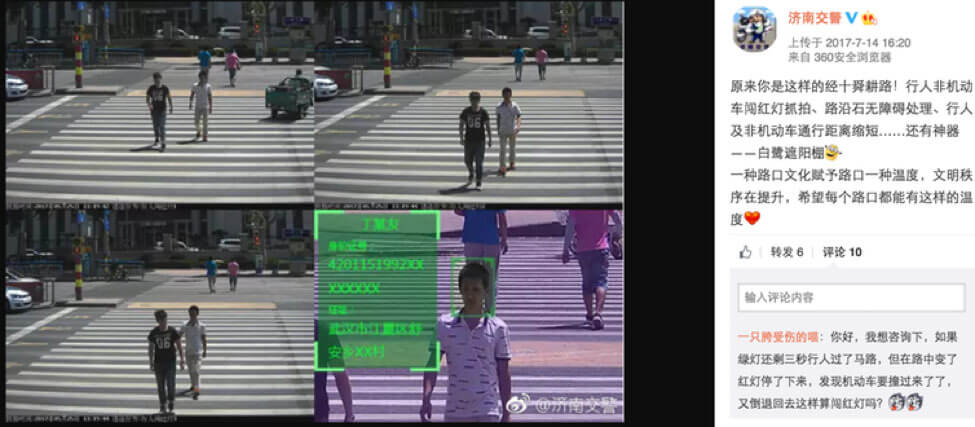
(Ninan Transport Police demonstrates how facial recognition is used to identify pedestrians jaywalking. Credit: Nanjin Transport Police’s public Weibo post)
Interestingly, the Chinese government does not plan for this system to be a unified platform; you won’t just enter your ID and get your social credit. Think of this social credit as an ‘ecosystem’ of bureaucratic scrutiny being administered by cities, neighbourhoods, government ministries, online payment providers, etc. All of these services will be interconnected by the ‘magic’ of big data.
The reasons for not unifying this system are China’s past experiences. They’ve tried their hand at collective farming, ending in a disaster. Later they tried a system called ‘danwei’ (单位). Danwei were work units which provided employment, housing, food, healthcare facilities, etc to their members in Mao’s China. Not being a member of a danwei meant one did not receive any of the above said facilities. Danwei were intimately involved in their member’s personal lives, e.g., members had to take permission from their Danwei before undertaking activities such as travel, marriage, having children, etc. On a side note, these Danwei were fundamental in enforcing China’s erstwhile one-child policy as the Danwei monitored the reproductive behavior of their members! I think it’s not hard to understand why the Danwei failed.
Another example is of the Hukou (户口) or Huji (户籍) system. This was a system for housing registration which allowed the government to keep tabs on where people lived, worked, and where they sent their children to school. The Huji system was rendered useless by China’s rapid urbanization following the 1980s. All in all, previous attempts by the Chinese government at a unified, central, ‘command and control’ type of system have failed. This time around, it’s neither central nor unified. Each individual sub-system within the ecosystem will have its own weights, rules, punishments, rewards, etc. The CPC at the most, will issue guidelines so the various systems aren’t too varied from each other. Another major change has simply been technology. Technologies such as big data and artificial intelligence simply make it much easier to keep tabs on a billion people, more so than it was ever possible in the past. Decentralization and technology, both these factors greatly increase the probability of this ecosystem to succeed.
What it means for ESG?
China’s social credit system is not limited to the masses; this vast mammoth of a system will cover companies as well. Companies too will have their own social credit scores, and as we have discussed earlier it will not end being a single score for each company. Instead, the government plans a diversified and decentralized market for social credit rating; several different credit ratings with varying assessment criteria, each employed for a different purpose. Examples include the central government credit records highlighting major offenses, sectorial social credit ratings, commercial credit rating services, and the credit rating center of the People’s Bank of China.
The Peoples’ bank of China will also be one of the top data providers for this ecosystem.
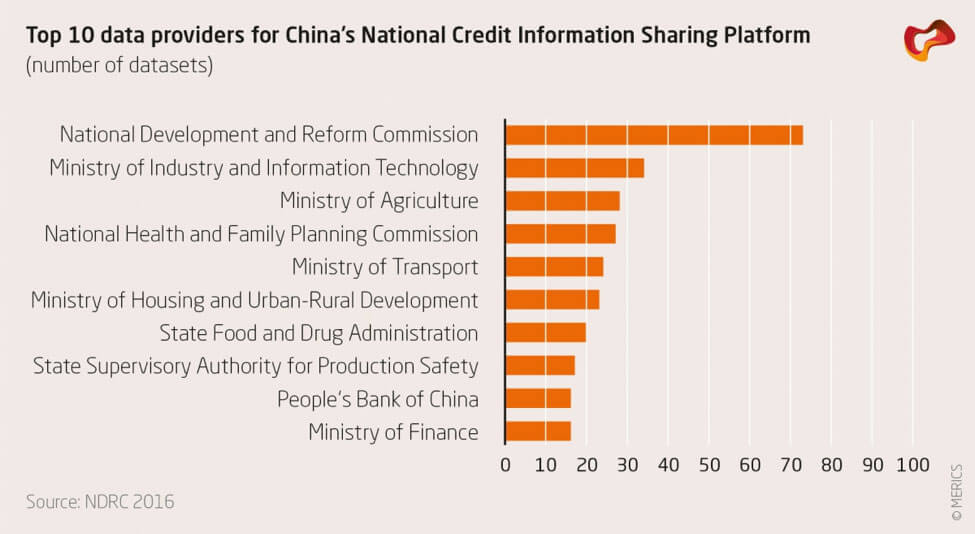
This Social Credit System has the potential to fundamentally change the way ESG works, and also, the economy itself. So, how does ESG currently work? Countries have their own environmental and labor-related regulations which companies must abide by and failing which there is a legal battle in court; additionally there are ESG ratings and scores published for most firms which can encourage and discourage investors from investing in a company. China’s Social Credit System will automate this process, removing bureaucracy, delays and bypassing the lengthy (and at times, faulty) judicial process.
The social credit system will be powered by real-time data collection. Whenever a company does something illegal or fails to abide by government regulations, the company’s social credit score will get decreased in real-time; of course the same holds whenever a company does something morally good, its score likewise will increase in real-time. Under China’s Social Credit System, a company will get a lower credit rating if it does not pay its loans back in time, if it does not comply with emissions targets, worker safety standards, or government investment requirements, or if it fails to deliver products ordered via e-commerce platforms on time. Possible punishments for companies with lower social credit ratings include unfavourable conditions for new loans, higher taxes, denial to issue bonds, denial to invest in other companies in the stock market, decreased chances to participate in publicly-funded projects, mandatory government approval for investments, etc. Company officials could even be denied tickets for high-speed train or airlines!

While this may seem as a move that may deter investment, but once again, the government in China doesn’t disappoint, it has thought this through. Currently, government approval is required for foreign investments. This social credit system will do away with that. Companies with high credit ratings will no longer require government approval for foreign investments. This move in my opinion is a masterstroke; firstly, it speeds up the process, no more bureaucratic involvement; secondly, it does away with any bribe or corruption that has been happening in this scenario…because no more bureaucratic involvement. Companies in China already are working on improving their ESG performance, in order to improve their ESG ratings or due to rising consumer awareness; this social credit system will give them the one thing that’s lacking, the most important lure, a monetary incentive; money makes the mare go.
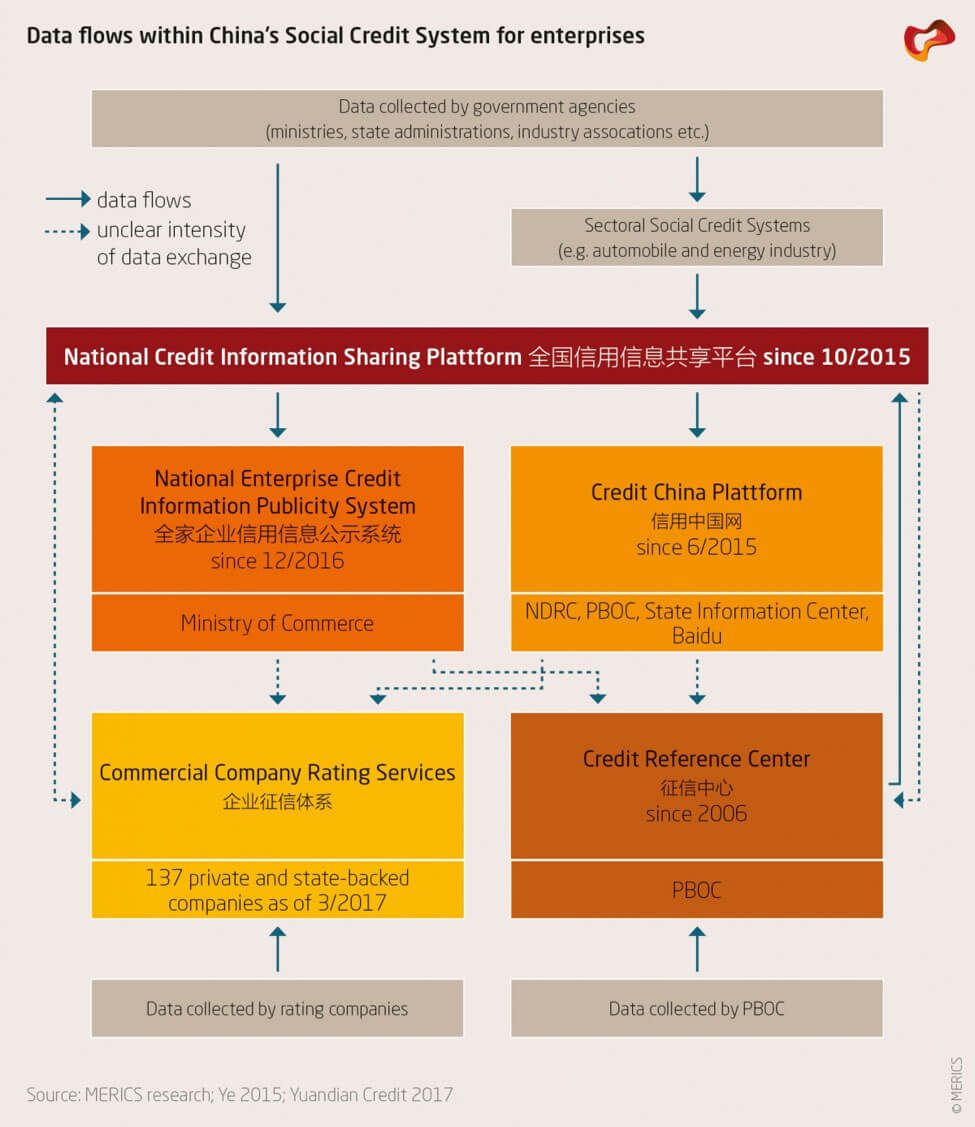
All said and done, one cannot help but ponder, is it really morally acceptable for government officials to be so intimately informed of a peoples’ day to day lives? Of course almost everyone agrees that people should have freedom, yes, but that shouldn’t include the freedom to cause anarchy or disrupt society. This alone happens to be the single biggest point in support of this social credit system. However, is this the only way? Move your eyes just a bit to the east and we have Japan. 10 minutes of an internet search on Japan will give us numerous accounts of how Japanese people are well mannered, honest, punctual, follow rules to the letter, etc. Moral values play an extremely important role in modern-day Japanese society, more so than in any other country. And they crafted such a society without any government policies or supervision systems, etc, simply through education and marketing; they made posters with popular comic and cartoon characters to subtly convince people to behave responsibly.
 A Japanese subway poster telling people not to inconvenience others on the train
A Japanese subway poster telling people not to inconvenience others on the train
If the Japanese could do it, why can’t everyone else do it? True, there are lots of other social factors, but most of them don’t apply to China as, just like Japan, China has a mostly homogeneous society with high population density. But, when you think about it, no one has been able to replicate Japan’s social success story, not even Scandinavian countries. So when you come to think of it, the Chinese Social Credit System is a much better solution to keep anarchy in check than tear gas and water cannons; and it inarguably better than the alternative, the anarchy actually succeeding, which by the way has happened in the recent past.


